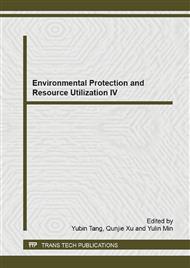p.1145
p.1152
p.1157
p.1162
p.1166
p.1171
p.1178
p.1182
p.1188
Evaluation of the Eco-Environmental Quality and its Index-Induced Influencing Factors in the Yangtze River Delta Urban Agglomeration
Abstract:
This paper aims to provide a clear understanding of the characteristics and spatial-temporal pattern of the eco-environmental quality (EEQ) in the Yangtze River Delta Urban Agglomeration. Based on the 500m × 500m pixel scale, the evaluation was carried out using the Ecological Index (EI). Results show that the EEQs are both classified into “Moderately high” level in 2005 and 2010. It exhibits obvious spatial variability with Shanghai-Nanjing belt as a demarcation belt, indicating that EI values are higher in the south and lower in the north while EEQ in the belt is the worst. Further research demonstrates it is policy-induced emission reduction that gave rise to the overall eco-environmental improvement from 2005 to 2010, followed by an increase in the volume of water resources and green space. The EEQs of Shanghai, Jiaxing, Nantong, Lianyungang, Yancheng and Xuzhou are more constrained and influenced by EI-related factors.
Info:
Periodical:
Pages:
1166-1170
Citation:
Online since:
December 2014
Authors:
Price:
Сopyright:
© 2015 Trans Tech Publications Ltd. All Rights Reserved
Share:
Citation:


